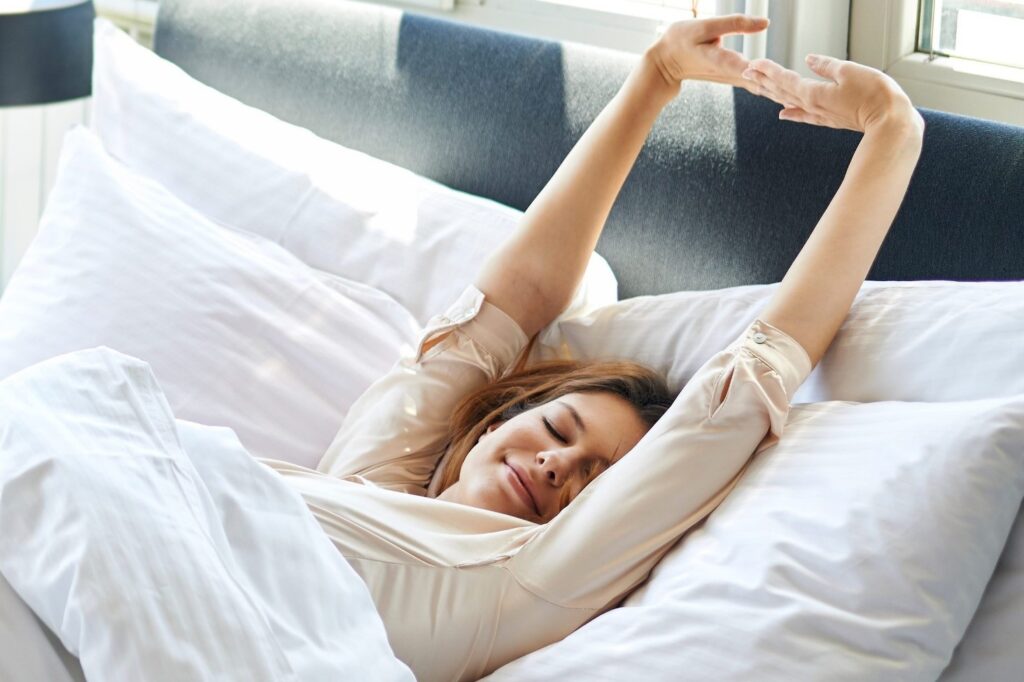Did you know that your general health can be significantly impacted by the way you sleep? The majority of individuals require seven to eight hours of sleep every day, according to the National Sleep Foundation. However, due to misunderstandings regarding sleep and its physiological implications, many people do not obtain the recommended amount of sleep. Numerous misconceptions exist regarding sleep.
You’ve likely heard them all: you should get eight hours of sleep every night, consuming coffee before bed will keep you awake, and late nights cause disturbed sleep. But which of these assertions is true? Or are they only preventing you from getting the necessary rest? In this blog article, we’ll debunk some of the most widespread misconceptions about sleep and offer advice on how to get the rest you need. So continue reading, sleepyhead—you might be shocked!
-
Table of Contents
You Can Make Up For Lost Sleep On The Weekends
The first and most pervasive sleep myth is the idea that you can make up for lost sleep during the weekend. Even if many people do have a tendency to sleep longer on the weekends, this does not necessarily make up for the hours that were missed during the week. In fact, sleeping in on the weekends might affect your body’s circadian cycle and lead to later sleep of worse quality. It is estimated that sleeping in on the weekends only makes up approximately 10% of the sleep you miss during the week, so if you aren’t getting enough shut-eye during the week, try to maintain a regular sleep pattern as much as you can.
-
Sleep Deprivation Is Not Linked To Weight Gain

Another prevalent misconception about sleep is that getting the required amount of sleep may prevent weight gain. While it is true that those who get enough sleep generally have better metabolic health, there is no clear correlation between sleep deprivation and weight growth. In reality, several studies have demonstrated that while a lack of quality sleep or poor sleep quantity may lead to an increase in hunger and overeating, this does not always result in additional weight gain over time. Therefore, as long as you are receiving adequate sleep regularly, it won’t substantially influence your weight if you occasionally experience sleepless nights.
-
Mattresses Don’t Play a Major Part
Contrary to popular belief, the type of mattress you sleep on does not directly impact your weight. While some mattresses may be designed to promote better sleep quality and support healthier sleeping habits, there is no direct association between the two. IF you are sleeping on an average mattress, it does affect your health – just not in the way most people assume. Moreover, this updated list of top-rated mattresses on the market can help you find a mattress that fits your needs and helps you sleep better.
-
Late Night Caffeine Can Keep You Up All Night

The idea that ingesting coffee before bed can keep you up all night long is another popular misunderstanding regarding sleep. While it is true that caffeine has a stimulating effect, some people are immune to its effects and only endure for a few hours after ingestion. So go ahead and have that final cup of coffee or tea if you need an energy boost late at night. Additionally, the timing of your caffeine intake is more significant than the amount when it comes to the quality of your sleep.
-
Lack of Exercise Affects Sleep Quality
Lack of routine exercise is another frequent issue that might influence the length and quality of your sleep. The number and quality of your sleep can both be improved by regularly exercising, according to studies. Therefore, if you have difficulty falling asleep at night, exercise frequently during the day. Additionally, timing is crucial when it comes to exercise; avoid engaging in strenuous activities right before going to bed.
-
Sleep Deprivation and Your Metabolism

Another frequent link between sleep and weight is that a slower metabolism, which results in weight gain, can be caused by receiving less sleep. Scientific research, however, has generally refuted this assertion because there is no evidence to support any connection between the two. In fact, studies have shown that those who get enough sleep often have healthier metabolisms than those who don’t.
-
Insufficient Sleep is Linked to Higher Disease Risk
The idea that sleep has no bearing on general health is among the most prevalent ones. In fact, research has shown that getting too little sleep raises your chance of contracting illnesses, including diabetes and heart disease. This is so that many facets of body function, such as hormone control and immunological response, are severely impacted by insufficient sleep. So be sure to get enough sleep every night to retain good general health!
-
Alcohol Helps You Sleep Better

The idea that alcohol encourages sound sleep is another pervasive misconception regarding sleep. Contrary to popular belief, drinking before bed interferes with your sleep cycle and prevents you from getting enough rest. Avoid drinking excessively if you want to obtain a decent night’s sleep because it can potentially cause long-term insomnia problems. Additionally, a lot of individuals think that drinking caffeine will help you stay awake even when you’re weary. However, excessive caffeine use might actually make it more difficult for you to fall asleep at night by elevating your feelings of anxiety and restlessness.
-
Napping During The Day Will Make You Less Tired At Night
The final and most widespread sleep delusion is the idea that taking a nap during the day would help you sleep better at night. In actuality, taking a little nap throughout the day can help your body recover from everyday living stressors, which will increase the quality and length of your sleep. In order to boost your energy levels and get back on track with healthy sleep, don’t be afraid to take a little power nap if you have trouble falling asleep or staying asleep at night.
Conclusion
In conclusion, the aforementioned sleep misconceptions are preventing you from obtaining the rest and renewal your body requires to perform at its peak. You can regain control of your health and make sure that you receive the high-quality sleep you need by dispelling these widespread myths and adopting healthy practices that encourage good sleep.
For more informative blogs, stay in touch with StyleinFlux.
